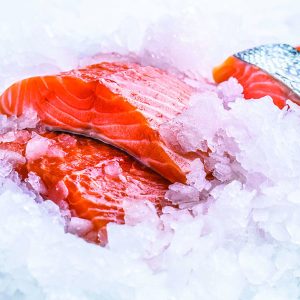Q&A with Sealaska President & CEO Anthony Mallott – 2020 Annual Report

The 2020 Sealaska annual report was sent to shareholders on May 5, 2021. Sealaska’s communications team met with President & CEO Anthony Mallott to get his thoughts on last year’s performance and describe how the company’s ocean health businesses are leading to increased shareholder benefits. The full annual report is available online by clicking here.
What are the highlights from 2020 from a financial perspective?
We were incredibly fortunate to be able to provide more dividends, more programs and more of the positive results our shareholders care about in 2020. Shareholder benefits increased by more than 20% over 2019, and are triple what they were in 2014. We are able to make significant investments in shareholder programs, like scholarships, the Deishú Memorial Fund, language preservation and more, because our focus on ocean-health businesses and alignment with our values is an incredibly powerful formula. We are focused on things that matter to us and to our greater global community: clean oceans and a sustainable, nutritious food supply. We are following cultural values that emphasize balance, respect, curiosity and problem solving.
Our 2020 results and those from the previous several years will benefit Sealaska shareholders and their descendants, and their descendants’ descendants, as far into the future as we can imagine because we’ve established endowments to fund some of the programs our shareholders have told us are most important to them. That is the source of incredible gratitude on the part of so many of us here, because we know this is our most important task as a company.
How is Sealaska working with partner organizations to amplify the impact of benefit programs?
The $28 million Sealaska spent on shareholder benefits in 2020 is just part of the story. For example, in 2020, Sealaska contributed $2.8 million to Sealaska Heritage Institute. That was higher than our normal annual contribution to SHI because they are in the process of building out their new Arts Campus that will establish Juneau as the Northwest Coast arts capital of the world. SHI leverages our contributions to attract funding from other organizations, and that translates to more opportunities for our visual artists, carvers, jewelry makers, weavers and those who are committed to learning and preserving our traditional languages. Similarly, our $500,000 support for Spruce Root in 2020 was well above our normal annual contribution because we recognized that Spruce Root was going to play a critical role in helping Southeast entrepreneurs find ways to adapt their businesses and keep our economy intact during the COVID-19 pandemic. They expanded programming, offered more online services, and were in turn recognized by other funders for their work, again increasing the impact of our support. We teamed up with the Alaska Longline Fishermen’s Association out of Sitka to distribute 49,000 pounds of Orca Bay salmon to smaller Southeast communities this summer that were hit by the pandemic and a historically weak salmon season. We worked more intentionally on our partnerships than ever before this year and saw our impact greatly magnified.
Net income decreased in 2020. Why?
Our drop in net income in 2020 was not a result of our businesses faltering, it was a result of having varied income sources. Most of us have heard the advice that investments should be diversified. In a given year, there will be gains in some categories and losses in others, and that’s what happened in 2020, but a single year doesn’t change our overall trend line. Our long-term trend is positive.
There were three major factors at play in the decline in net income in 2020. Both earnings on our investments and income from 7(i) revenue sharing under the terms of the Alaska Native Claims Settlement Act were down in 2020, due primarily to the pandemic. We also realized one-time expenses from the discontinuation of Sealaska Timber Corporation. The fuller picture of Sealaska’s financial performance is found in what’s known as Operating EBITDA – earnings before interest, taxes, depreciation and amortization. Operating EBITDA provides us with a better, more well-informed financial metric because it shows the performance of the businesses we operate, and the things we have control over. Operating EBITDA was at its highest level ever in 2020 because the businesses we own and operate were well positioned to withstand some of the shocks brought on by the pandemic, and because our people were flexible and nimble and kept things on track.
Sealaska acquired New England Seafood International, Ltd. (NESI) in 2020. What does it mean for us?
The partnership with NESI is going to have the same additive effect on our growth story as all of the other acquisitions we’ve made in recent years. It’s going to contribute to greater gross revenue, increased EBITDA, add depth to our seafood-industry expertise, open up new partnership opportunities and access to markets, and advance our vision. NESI will be key to how we achieve our vision of ocean health because they are a like-minded organization that bring new skills to our organization.
What does Sealaska mean when it talks about “ocean health”?
Broadly speaking, we’re talking about businesses that in some way contribute to improving or preserving the health of our oceans. We are actively building our knowledge and understanding of all kinds of scientific and engineering processes to clean up pollution in the ocean; safely remove old offshore infrastructure; understand the seismic conditions offshore so we can help support clean-energy development; and use safe, biological processes to clean up contamination in soils and groundwater. We are also referring to the responsible harvest and preparation of sustainable seafood species. Seafood has a significantly lower environmental impact than other animal proteins and we’d like to help make it accessible to more consumers as part of our overall commitment to addressing our earth’s changing climate.
The beauty of this business strategy is that what we’re doing is working. It’s working toward a vision that we believe in and our shareholders believe in. We’ve committed to this singular focus of building a business around ocean health so we can use that success to advance the education and career development of our people. And just because we create great business success doesn’t mean we will ever stop trying to grow. Not for growth’s sake, but because we know that our business success can continually come back to our shareholders and their communities.
(Read more about Sealaska’s approach to ocean health here.)









 Previous
Previous